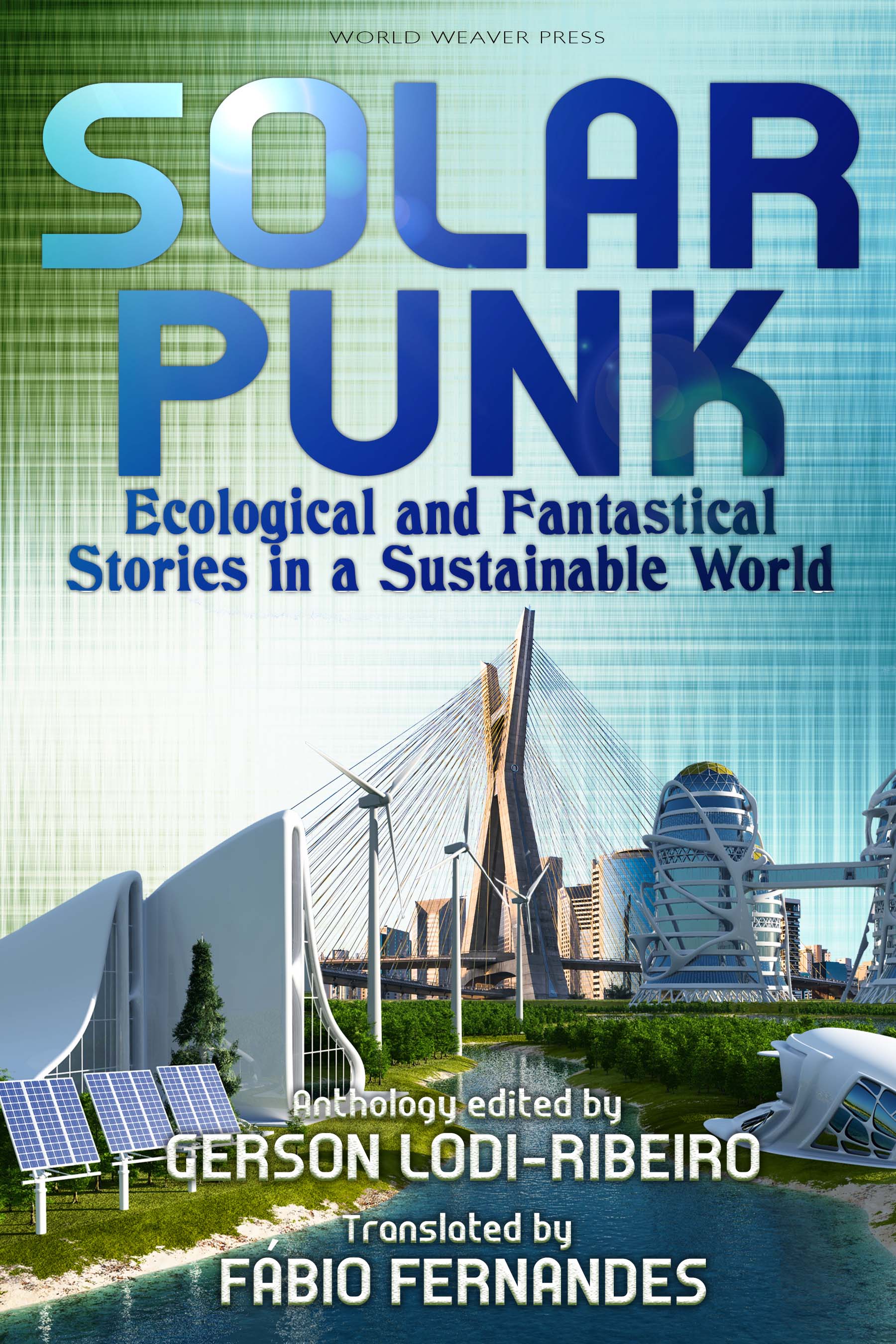Solarpunk: Ecological and Fantastical Stories in a Sustainable World
4 stars
Solarpunk: Ecological and Fantastical Stories in a Sustainable World est la traduction en langue anglaise de la toute première anthologie de nouvelles solarpunk publiée dans le monde. La version originale avait été dirigée par Gerson Lodi-Ribeiro et publiée en 2013 au Brésil ; la version anglaise dont je vais vous parler ici a été traduite par Fabio Fernandes et publiée en 2018 chez World Weaver Press.
Imagine a sustainable world, run on clean and renewable energies that are less aggressive to the environment. Now imagine humanity under the impact of these changes. This is the premise Brazilian editor Gerson Lodi-Ribeiro proposed, and these authors took the challenge to envision hopeful futures and alternate histories. The stories in this anthology explore terrorism against green corporations, large space ships propelled by the pressure of solar radiation, the advent of photosynthetic humans, and how different society might be if we had switched to …
Solarpunk: Ecological and Fantastical Stories in a Sustainable World est la traduction en langue anglaise de la toute première anthologie de nouvelles solarpunk publiée dans le monde. La version originale avait été dirigée par Gerson Lodi-Ribeiro et publiée en 2013 au Brésil ; la version anglaise dont je vais vous parler ici a été traduite par Fabio Fernandes et publiée en 2018 chez World Weaver Press.
Imagine a sustainable world, run on clean and renewable energies that are less aggressive to the environment. Now imagine humanity under the impact of these changes. This is the premise Brazilian editor Gerson Lodi-Ribeiro proposed, and these authors took the challenge to envision hopeful futures and alternate histories. The stories in this anthology explore terrorism against green corporations, large space ships propelled by the pressure of solar radiation, the advent of photosynthetic humans, and how different society might be if we had switched to renewable energies much earlier in history.
Après une très belle préface de Serena Ulibarri, l’anthologie propose neuf nouvelles :
- Soylent Green is People ! de Carlos Orsi : dans un futur où les thérapies géniques et les implants cybernétiques sont monnaie courante, un détective privé est engagé pour enquêter sur la mort d'un ingénieur quinquagénaire et sur la disparition de sa mère handicapée ; en effet, le testament de la mère, fervente croyante, lègue sa fortune à l'Eglise dans le cas où elle décèderait après son fils ; les circonstances exactes de la mort de l'homme et l'éventuelle survie de sa mère ont donc une importance capitale pour les éventuels héritiers
- When Kingdoms Collide de Telmo Marçal : alors que les ressources notamment alimentaires se ratifient, une partie de la population choisit d'entrer dans un processus de chlorophyllisation pour se nourrir uniquement de la lumière du soleil, créant ainsi un schisme dans la société et s'installant dans des colonies autonomes, ce qui ne plait pas à tout le monde
- Breaking News ! de Romeu Martins : au Brésil, une journaliste radio fait un reportage sur la manifestation contre un laboratoire agroalimentaire d'une multinationale, où se déroulent des expérimentations sur des OGM, et peut-être plus ...
- Once Upon a Time in a World de Antonio Luiz M. C. Costa : dans cette uchronie où les énergies fossiles et le nucléaire ont été interdits après une grande guerre mondiale, les énergies renouvelables ont ransformé la géopolitique au profit des pays du Sud ; on croise dans ce récit parfois dérangeant des personnalités connues du XXe siècle
- Escape de Gabriel Cantateira : après une guerre pour le contrôle des dernières énergies fossiles disponibles, le monde s'est reconstruit avec des énergies renouvelables, notamment l'énergie solaire ; cela s'est fait au bénéfice de compagnies privées ; une femme détient la preuve d'un complot visant à étendre plus encore le pouvoir du privé sur le gouvernement brésilien
- Gary Johnson de Daniel I. Dutra : l'empreinte solarpunk est faible dans ce récit néanmoins très réussi autour d'une découverte scientifique par un savant et un prêtre au début du XXe siècle, autour d'une source d'énergie qui pourrait bouleverser le monde, la société, et les rapports humains
- Xibalba Dreams of the West de André S. Silva : dans un Brésil théocratique héritier de l'empire Maya, une enseignante est confrontée au souvenir de son père, condamné à mort lorsqu'elle était une jeune fille
- Sun in the Heart de Roberta Spindler : un couple s'inquiète, le jour où leur fils de sept ans, atteint d'une leucémie, va enfin recevoir son implant solaire qui va permettre à son corps de vivre grâce au soleil
- Cobalt Blue and the Enigma de Gerson Lodi-Ribeiro : deux factions d'un Brésil futuriste s'affrontent dans le système solaire par l'intermédiaire d'un super-héros en armure et d'un super-vilain vampirique
Comme je le disais, cette anthologie est la première au monde à avoir regrouper des nouvelles solarpunk. Cela se sent, on perçoit que le genre se cherchait encore, dans ses aspects et ses frontières. Cela donne un recueil parfois déroutant mais passionnant à lire, avec des textes très différents mais qui m’ont tous plu, à leur façon.

